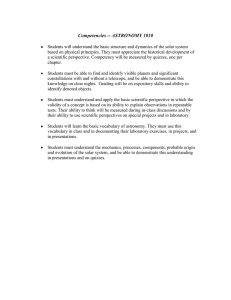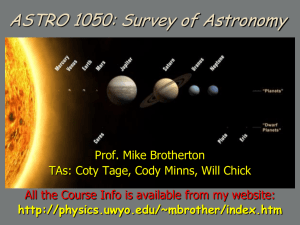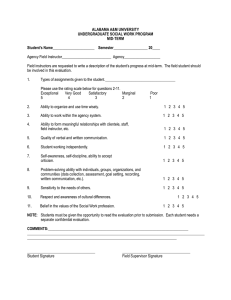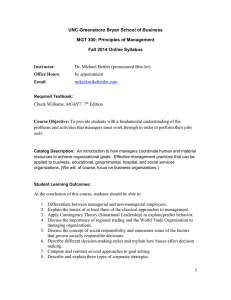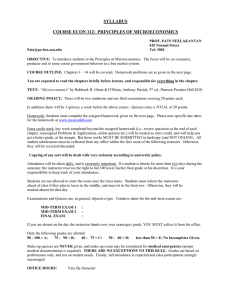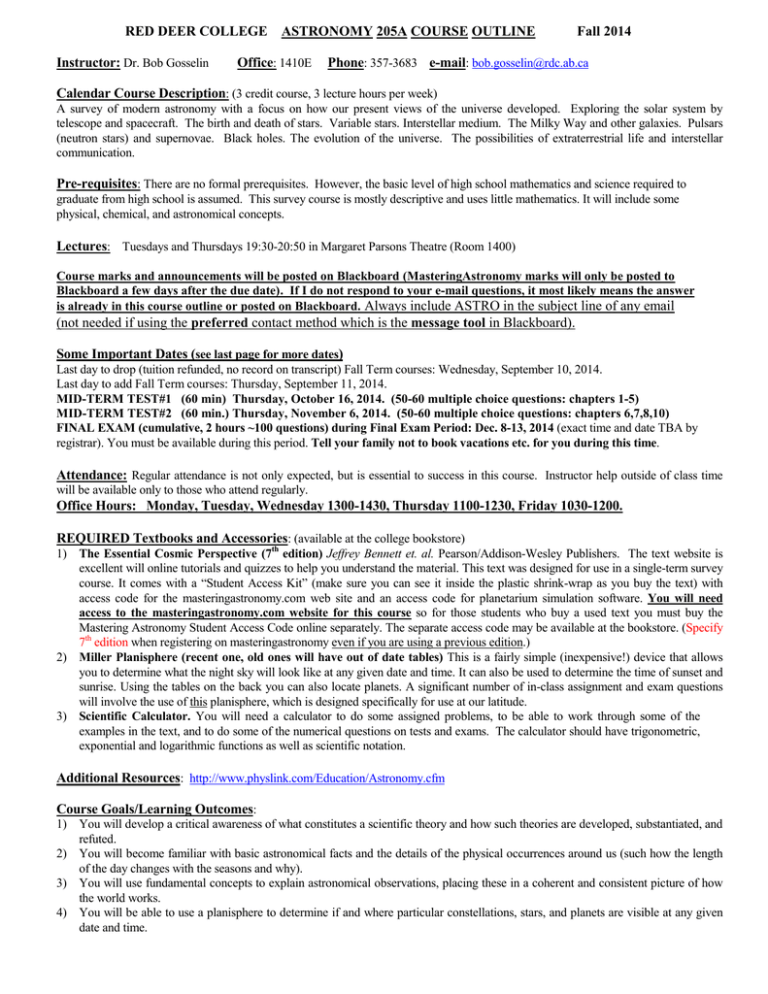
RED DEER COLLEGE
Instructor: Dr. Bob Gosselin
ASTRONOMY 205A COURSE OUTLINE
Office: 1410E
Fall 2014
Phone: 357-3683 e-mail: bob.gosselin@rdc.ab.ca
Calendar Course Description: (3 credit course, 3 lecture hours per week)
A survey of modern astronomy with a focus on how our present views of the universe developed. Exploring the solar system by
telescope and spacecraft. The birth and death of stars. Variable stars. Interstellar medium. The Milky Way and other galaxies. Pulsars
(neutron stars) and supernovae. Black holes. The evolution of the universe. The possibilities of extraterrestrial life and interstellar
communication.
Pre-requisites: There are no formal prerequisites. However, the basic level of high school mathematics and science required to
graduate from high school is assumed. This survey course is mostly descriptive and uses little mathematics. It will include some
physical, chemical, and astronomical concepts.
Lectures: Tuesdays and Thursdays 19:30-20:50 in Margaret Parsons Theatre (Room 1400)
Course marks and announcements will be posted on Blackboard (MasteringAstronomy marks will only be posted to
Blackboard a few days after the due date). If I do not respond to your e-mail questions, it most likely means the answer
is already in this course outline or posted on Blackboard. Always include ASTRO in the subject line of any email
(not needed if using the preferred contact method which is the message tool in Blackboard).
Some Important Dates (see last page for more dates)
Last day to drop (tuition refunded, no record on transcript) Fall Term courses: Wednesday, September 10, 2014.
Last day to add Fall Term courses: Thursday, September 11, 2014.
MID-TERM TEST#1 (60 min) Thursday, October 16, 2014. (50-60 multiple choice questions: chapters 1-5)
MID-TERM TEST#2 (60 min.) Thursday, November 6, 2014. (50-60 multiple choice questions: chapters 6,7,8,10)
FINAL EXAM (cumulative, 2 hours ~100 questions) during Final Exam Period: Dec. 8-13, 2014 (exact time and date TBA by
registrar). You must be available during this period. Tell your family not to book vacations etc. for you during this time.
Attendance: Regular attendance is not only expected, but is essential to success in this course. Instructor help outside of class time
will be available only to those who attend regularly.
Office Hours: Monday, Tuesday, Wednesday 1300-1430, Thursday 1100-1230, Friday 1030-1200.
REQUIRED Textbooks and Accessories: (available at the college bookstore)
1) The Essential Cosmic Perspective (7th edition) Jeffrey Bennett et. al. Pearson/Addison-Wesley Publishers. The text website is
excellent will online tutorials and quizzes to help you understand the material. This text was designed for use in a single-term survey
course. It comes with a “Student Access Kit” (make sure you can see it inside the plastic shrink-wrap as you buy the text) with
access code for the masteringastronomy.com web site and an access code for planetarium simulation software. You will need
access to the masteringastronomy.com website for this course so for those students who buy a used text you must buy the
Mastering Astronomy Student Access Code online separately. The separate access code may be available at the bookstore. (Specify
7th edition when registering on masteringastronomy even if you are using a previous edition.)
2) Miller Planisphere (recent one, old ones will have out of date tables) This is a fairly simple (inexpensive!) device that allows
you to determine what the night sky will look like at any given date and time. It can also be used to determine the time of sunset and
sunrise. Using the tables on the back you can also locate planets. A significant number of in-class assignment and exam questions
will involve the use of this planisphere, which is designed specifically for use at our latitude.
3) Scientific Calculator. You will need a calculator to do some assigned problems, to be able to work through some of the
examples in the text, and to do some of the numerical questions on tests and exams. The calculator should have trigonometric,
exponential and logarithmic functions as well as scientific notation.
Additional Resources: http://www.physlink.com/Education/Astronomy.cfm
Course Goals/Learning Outcomes:
1) You will develop a critical awareness of what constitutes a scientific theory and how such theories are developed, substantiated, and
refuted.
2) You will become familiar with basic astronomical facts and the details of the physical occurrences around us (such how the length
of the day changes with the seasons and why).
3) You will use fundamental concepts to explain astronomical observations, placing these in a coherent and consistent picture of how
the world works.
4) You will be able to use a planisphere to determine if and where particular constellations, stars, and planets are visible at any given
date and time.
On-line Tutorials/Assignments/Quizzes These are worth 15% of the final mark for this course. They will be assigned at least
every week and are due (see my dates on next page) about two weeks later (except for the last assignment) by 10am. I have set-up an
automatic extension on masteringastronomy.com to my dates to account for possible computer glitches etc. DO NOT COUNT ON THIS
EXTENSION – IT IS ONLY THERE “JUST IN CASE”. Assignments are due at 10am on the dates listed in this course outline.
Once you have registered at masteringastronomy.com (use your nine digit RDC ID number (eg. 000123456) as your ID number), you
must “JOIN A COURSE” (The Course ID is MAGOSSELINFALL14 ) for me to be able to give you credit for the work that you
do. If you don’t do this you will not get credit for the work done. The masteringastronomy.com “due date” is not the actual due
date, my due date is two days earlier. Plan to submit it at least three days before this in case of computer problems or questions.
My due date is listed on the schedule on page 3 If you have any technical problems, contact the masteringastronomy technical help
services. Please read the instructions regarding saving tutorials on my Blackboard main content page BEFORE doing any of the
tutorials.
Time Commitment: You will only be able to succeed in this course if you keep up with the material as it is covered in class and all
the assigned work. As for any normal university level course, this requires AT LEAST two hours (outside of class) per lecture hour for a
total minimum commitment of NINE hours per week. Drop this course NOW if you cannot commit to the required time. This is the time
recommended by most educators and tutors. Your text authors, and David Ellis in “Becoming a Master Student” (Coles Survival Inc.)
recommend two hours per lecture hour. The team at CliffsNotes ( http://www.cliffsnotes.com/WileyCDA/Section/How-much-outsideclass-study-time-is-recommended-for-every-hour-of-class-time-for-college-freshmen-.id-305397,articleId-7601.html ) says
“Each unit of credit requires 2 to 3 hours of outside class-work per week. So, a student
carrying 15 credit hours should plan to spend 30 to 45 hours each week studying beyond
the classroom.”
Assigned Reading: This is a survey course in astronomy which means that we cover a lot of material without going into a lot of
mathematical detail. The text has been chosen to complement the lectures so that do not have to take extensive notes during the lecture.
All the material we will be covering is in the textbook, on-line tutorials or included with the planisphere. Focus on understanding what is
being done in the lecture and please ask questions if you do not understand. If you have difficulty following the lectures, pre-reading the
text sections to be covered (see next page) will help.
In-Class Planisphere Quiz: One question at end of class roughly every week starting the third week. There will be a total of eight
quizzes. To account for ANY possible absences you only need to do five of them. If you submit more than five quizzes for
grading, they will also be included in your mark (ie. it is NOT the best five out of eight).
NOTES
1. Tests missed without prior arrangement or Doctor's certificate will be assigned a mark of 0. Excused evaluation items will usually
have their weight added to the final exam. THERE WILL BE NO MAKE-UP TESTS.
2. Changes in the component weightings and course content may be made by the instructor and a majority of the students with the
approval of the course chairperson.
3. Regular attendance is assumed. Out of class help will be denied for non-regular attendees.
4. GRADING. Grades from A+ to F will be assigned by the instructor according to student rank and instructor judgment. Students
with almost the same mark should get the same grade, so there are no predetermined, exact cut-offs between letter grades
A+,A,A-=excellent, B+,B,B-=good, C+,C,C-=satisfactory, D,D+=unsatisfactory, F=fail
Evaluation
A letter grade will be assigned (see RDC calendar for more details) corresponding to qualitative description of your performance in the
course (e.g., an excellent performance gets an A or A-). Your total mark will be calculated the weighted average of your marks on all
components of the course:
Two Mid-Term Tests (60 minutes) (15% each)
30%
WEIGHTING OF COURSE
COMPONENTS
On-Line Tutorials/Assignments/Quizzes (although two weeks 15%
are given, it should be done well before due time listed on the
next page . Late items will be given zero, no exceptions since
two weeks is plenty of time to get it done)
In-Class Quizzes (Planisphere). To account for possible illness 15%
etc., you are allowed miss three out of the eight with no penalty)
Final Exam (comprehensive with about half the test on material 40%
since the second mid-term, 2 hours, ~100 questions)
TOTAL =
100%
A MID-TERM GRADE will be calculated and a grade assigned based on your mark for Mid-Term(s) (at 70% weight) and
planisphere quizzes (at 30% weight). The results will be posted on or by Friday, October 24, 2014. The only purpose of this grade
is to give you an idea of how well you are doing. It will not appear on your transcript.
Page 2
0
1
2
3
4
0
1
2
5
3
6
4
7
5
8
6
9
7
10
8
9
11
10
12
13
11
12
13
Thu-Sep-4
Tue-Sep-9
Thu-Sep-11
Tue-Sep-16
Thu-Sep-18
Tue-Sep-23
Thu-Sep-25
Tue-Sep-30
Thu-Oct-2
Tue-Oct-7
Thu-Oct-9
Tue-Oct-14
Thu-Oct-16
Tue-Oct-21
Thu-Oct-23
Tue-Oct-28
Thu-Oct-30
Tue-Nov-4
Thu-Nov-6
Tue-Nov-11
Thu-Nov-13
Tue-Nov-18
Thu-Nov-20
Tue-Nov-25
Thu-Nov-27
Tue-Dec-2
Sun-Dec-7
Tue-Dec-9
Chapter
A# due
date
A# 10am Date
FALL 2014 TENTATIVE SCHEDULE OF TOPICS
1
2
2
3
4
4
5
5
5
6
7
7
8
10
11
11
12
13
14
15
16
17
18
Scientific Notation, solar system scale, long. & lat., time zones, [ Appendix C]
, Celestial sphere, RA & DEC, star day, year, seasons,
precession, moon, month, phases, eclipses,
Science of Astronomy/development, earth-centered universe PLANISPHERE-stars
Understanding Motion, Energy and Gravity P1
Understanding Motion, Energy and Gravity, Tides
Light and Blackbody Radiation; P2
Spectra and Atoms, Doppler Shift
Optics and Telescopes; Radio Astronomy P3
Formation of the Solar System PLANISPHERE-planets
Earth, atmosphere, plate tectonics, magnetic field;
terrestrial planets: Mercury, Venus, Mars; P4
TEST#1(60 min in class to Chapter 5 inclusive)
Outer Planets: Jupiter, Jupiter's moons & rings, Saturn, Uranus, Neptune
Sun: Atmosphere, Weather, Interior; Nuclear Fusion; Neutrinos P5
parallax; Apparent & absolute magnitude. Classification. Temperature
HR diagrams, Binary Stars & stellar mass. PLANISPHERE-Sun
Star birth, Life as low and high mass stars P6
TEST#2(60 min in class) (Chaptesr6-10 inclusive, skipping chapter 9)
COLLEGE CLOSED
White Dwarves, Neutron Stars, Black Holes, Gamma Ray Bursts
Milky Way Galaxy, Galactic Recycling P7
Universe of galaxies, distances, evolution, quasars
cosmology, creation of matter, anti-matter; density of matter & future evolution
Big Bang: Evidence, Inflation P8
Life in the Universe, SETI, Drake equation
duringDec 8-13
FINAL EXAM cumulative with more questions on material since Test#2
FINAL EXAM in GYM - RDC Student ID required to write exam
^^^^^^^^^^^^^^MY Assignment due dates. They should be completed at least two days in
advance of this. (Note "due date" on masteringastronomy is later to allow for
technical problems only! masteringastronomy's "due date" is NOT the actual due
P1-P8 In-Class Planisphere Quiz: There will be a total of eight quizzes. To account for
possible absences you only need to do five of them. If you submit more than five quizzes
they will be also be included in your mark.
MASTERING ASTRONOMY COURSE ID IS:
MAGOSSELINFALL14
Weighting of course components
30%
15%
15%
40%
100%
Two Mid-Term Exams (15% each)
MasteringAstronomy assignments
Planisphere Quizzes
Final Exam
page 3
Generic Statements & Information Required to be on All Course Outlines
It is the student’s responsibility to be familiar with the information contained in the Course Outline and to clarify
any areas of concern with the instructor.
Students should refer to the Formal and Informal Student Appeal Policies and Standard Practice should they have
questions or concerns about the Course Outline that cannot be resolved with the instructor.
Please be familiar with what constitutes academic misconduct, as well as the consequences. Plagiarism
involves submitting work in a course as if it were the student’s own work. Plagiarism may involve the act of
submitting work in which some or all of the phrasing, ideas, or line of reasoning are alleged to be the
submitter’s own but in fact were created by someone else.
The Final Examinations Policy will be followed with respect to final exams. Please review these documents to
ensure you understand the contents and implications of the policy.
Attendance may take many forms. Lack of attendance may impact the students’ ability to successfully complete
the course.
This course may be eligible for Prior Learning Assessment. Students should refer to the RDC College Calendar
for a list of excluded courses.
Classroom Learning Resources may be available to students in alternate formats.
Students should be aware that Personal Counseling, Career, Learning and Disability Services are provided by
RDC. Inquire about locations at Information Desk. It is the student’s responsibility to discuss their specific
learning needs with the appropriate service provider.
Important dates for the 2014 Fall Term at RDC (from college website June 4, 2014)
(see the previous pages of this course outline for other dates that are specific to this course)
03 Sep
First Day of Classes
05 Sep
Last Day to apply for Fall 2014
10 Sep
Last day to have tuition refunded for Fall Term 2014 courses
11 Sep
Last day to register for Fall Term 2014 courses
01 Oct
First day to apply for Fall term 2015
07 Oct
Emergency Response Day
13 Oct
Thanksgiving Day. College closed.
24 Oct
Mid-term feedback date
10 Nov
Final examination schedule posted
10 Nov
College Open. No credit classes
11 Nov
Remembrance Day. College Closed
03 Dec
Last day to withdraw from Fall Term 2014 courses and receive a WD on transcript
03 Dec
Last day of classes for Fall Term courses
08 Dec
First day of final examinations for Fall Term 2014 courses
13 Dec
Last day of final examinations for Fall Term 2014 courses
16 Dec
Deferred exams written for Fall Term 2014 courses
19 Dec
Last day for submission of final grades for Fall Term 2014 courses
22 Dec
Final grades for Fall Term 2014 courses available
22 Dec
Last day of course waitlist for Winter Term 2015
24 Dec
College closes at noon
02 Jan
College Opens. No credit classes
05 Jan
First day of classes for Winter Term 2015
07 Jan
Last day to apply for Winter term 2015
09 Jan
Last day to apply/pay fees for Winter Term 2015
12 Jan
Last Day to apply for supplemental exam for Fall Term 2014 courses
12 Jan
Last day to have tuition refunded for Winter Term 2015 courses.
17 Jan
Supplemental Exams for Fall Term courses written
Changes to the course outline will be made with the consent of the course instructor and students. Changes will be reviewed by the
Program Lead for consistency with College policies.
Program Lead:___________________________________
21 August 2014
Date:___________________________________
Page 4

